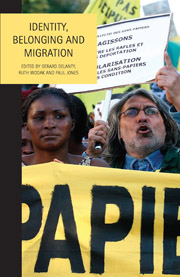Book contents
- Frontmatter
- Contents
- Acknowledgements
- List of Figures
- Notes on Contributors
- Introduction: Migration, Discrimination and Belonging in Europe
- I Theoretical Perspectives on Belonging
- II Institutional Forms of Discrimination
- 5 Racism, Anti-Racism and the Western State
- 6 What Space for Migrant Voices in European Anti-Racism?
- 7 Multiculturalization of Societies: The State and Human Rights Issues
- 8 Towards a Theory of Structural Discrimination: Cultural, Institutional and Interactional Mechanisms of the ‘European Dilemma’
- 9 On Institutional and Agentic Discrimination: Migrants and National Labour Markets
- 10 Non-Place Identity: Britain's Response to Migration in the Age of Supermodernity
- III Cases of Belonging and Exclusion
- Conclusion: Discrimination as a Modern European Legacy
- Index
7 - Multiculturalization of Societies: The State and Human Rights Issues
from II - Institutional Forms of Discrimination
- Frontmatter
- Contents
- Acknowledgements
- List of Figures
- Notes on Contributors
- Introduction: Migration, Discrimination and Belonging in Europe
- I Theoretical Perspectives on Belonging
- II Institutional Forms of Discrimination
- 5 Racism, Anti-Racism and the Western State
- 6 What Space for Migrant Voices in European Anti-Racism?
- 7 Multiculturalization of Societies: The State and Human Rights Issues
- 8 Towards a Theory of Structural Discrimination: Cultural, Institutional and Interactional Mechanisms of the ‘European Dilemma’
- 9 On Institutional and Agentic Discrimination: Migrants and National Labour Markets
- 10 Non-Place Identity: Britain's Response to Migration in the Age of Supermodernity
- III Cases of Belonging and Exclusion
- Conclusion: Discrimination as a Modern European Legacy
- Index
Summary
Twentieth-century ‘developed’ societies are part of a world that is generally considered to be characterized by a range of mobilities, with such societies frequently attempting to define themselves as ‘open’ to a range of flows. In the case of the European Union project, attempts to build up an economic system based on a ‘knowledge society’ – facilitated by the present regulations on tariffs, taxes and visas – are not simple measures contributing unproblematically to member states’ national growth: they are unequally distributed over the regions and sometimes counter-oriented. Indeed, in all the countries, internal socio-economic inequality contributes to an uneven access to – and relationship with – ‘knowledge’, an inequality that challenges the very notion of ‘open’ societies. However, even with this unequal context, multicultural-ization remains a process which attempts to open societies to a ‘world society’ (Habermas 2001). If we accept the concept of a world society, it assumes no territorial borders of the sort that define the nation-state's sovereignty, national identity and culture. Hence the question is not so much to qualify multiculturalism but to see how it develops and how the different cultures and languages manage to co-exist in one society and to share political and economic resources. We must consider the question of political organization and that of the orientation and mandate of these institutions at the same time.
- Type
- Chapter
- Information
- Identity, Belonging and Migration , pp. 134 - 151Publisher: Liverpool University PressPrint publication year: 2011



